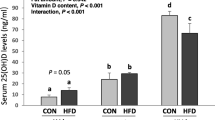Abstract
The supplemental effects of zinc on thyroid status in obese (ob/ob) mice were studied. Four-week-old obese mice and their lean controls were fed either a basal diet or a zinc-supplemented diet (200 mg/kg diet) for 8 wk. Following the 8-wk basal diet, obese mice had lower serum T4 values, as well as hepatic T4 and T3 values, than lean mice (p < 0.05). A significant decrease in hepatic 5′-deiodinase activity was also observed in obese mice. Dietary zinc supplementation significantly reduced serum T4 levels in both the obese and lean mice. However, the zinc-supplemented effects on diminishing hepatic T4 and T3 values, as well as on 5′-deiodinase activities, were found only in obese mice (p < 0.05). Furthermore, the 5′-deiodinase activities in hepatic microsomal pellets after incubation with various zinc concentrations (0.5, 1.0, and 2.5 mM) were also examined. The 5′-deiodinase activities, in hepatic samples from all mice, were significantly attenuated by zinc treatments. However, this effect was more predominant in obese mice following the addition of 0.5 mM zinc. This study suggests that a lower hepatic 5′-deiodinase activity, resulting from a higher zinc level, might be related to abnormal energy metabolism in theob/ob mice.
Similar content being viewed by others
References
P. J. Collipp, New development in medical therapy of obesity: thyroid and zinc,Pediatr. Ann. 13, 465–472 (1984).
M. D. Chen, P. Y. Lin, W. H. Lin, and V. Cheng, Zinc in hair and serum of obese individuals in Taiwan,Am. J. Clin. Nutr. 48, 1307–1309 (1988).
G. Di-Martino, M. G. Matera, B. De-Martino, C. Vacca, S. Di-Martino, and F. Rossi, Relationship between zinc and obesity,J. Med. 24, 177–183 (1993).
M. D. Chen, P. Y. Lin, V. Cheng, and W. H. Lin, Zinc supplementation aggravates body fat accumulation in genetically obese mice and dietary-obese mice,Biol. Trace Element Res. 53, 125–132 (1996).
S. K. Taneja, M. Mahajan, and P. Arya, Excess bioavailability of zinc may cause obesity in humans,Experientia 52, 31–33 (1996).
M. L. Kennedy and M. L. Failla, Zinc metabolism in genetically obese (ob/ob) mice,J. Nutr.117, 886–893 (1987).
N. Begin-Heick, M. Daple-Scott, J. Rowe, and H. M. C. Heick, Zinc supplementation attenuates insulin secretory activity in pancreatic islet of the ob/ob mouse,Diabetes 34, 179–184 (1985).
W. H. Lin, M. D. Chen, and P. Y. Lin, Investigation of the profile of selected trace metals in genetically obese (ob/ob) and lean (+/?) mice,J. Formosan Med. Assoc. 91, s27-s33 (1992).
M. D. Chen, P. Y. Lin, P. S. Chen, V. Cheng, and W. H. Lin, Zinc attenuation of GDP binding to brown adipocytes mitochondria in genetically obese (ob/ob) mice,Biol. Trace Element Res. 57, 139–145 (1997).
M. D. Chen, S. J. Liou, P. Y. Lin, V. C. Yang, P. Alexander, and W. H. Lin, Effects of zinc supplementation on the plasma glucose level and insulin activity in genetically obese (ob/ob) mice,Biol. Trace Element Res, in press.
W. L. Dai and R. I. Henkin, Hypothyroidism induces zinc deficiency in humans,Clin. Res. 42, A172 (1994).
G. Leblondel, A. Le-Bouil, and P. Allain, Influence of thyroparathyroidectomy and thyroxine replacement on Cu and Zn cellular distribution and on the metallothionein level and induction in rats,Biol. Trace Element Res. 32, 281–288 (1992).
H. C. Lukaski, C. B. Hall, and M. J. Marchello, Impaired thyroid hormone status and thermoregulation during cold exposure of zinc-deficient rats,Horm. Metab. Res. 24, 363–366 (1992).
J. W. Oliver, D. S. Sachan, P. Su, and F. M. Applehans, Effects of zinc deficiency on thyroid function,Drug-Nutr. Interact. 5, 113–124 (1987).
S. Fujimoto, I. Yasuhiro, A. Higashi, I. Matsuda, N. Kashiwabara, and I. Nakashima, Conversion of thyroxine into triiodothyronine in zinc-deficient rat liver,J. Paediatr. Gastroenterol. Nutr. 5, 799–805 (1986).
A. Kralik, K. Eder, and M. Kirchgessner, Influence of zinc and selenium deficiency on parameters relating to thyroid hormone metabolism,Horm. Metab. Res. 28, 223–226 (1996).
S. Kobayashi, Y. Gao, R. L. Ong, and C. S. Pittman, Substrate specificity of iodothyronine 5′-deiodinase in rat liver homogenates and its requirements of divalent cations in vitro,Life. Sci. 38, 2231–2238 (1986).
M. Gonzalez-Pondal, B. Paier, M. I. Noli, M. B. Tudino, J. D. Stripeikis, K. Hagmuller, and A. A. Zaninovich, Changes induced by zinc on thyroxine deiodination by rat liver in vivo and in vitro,Acta. Physiol. Pharmacol. Ther. Latinoam. 45, 35–41 (1995).
S. Nishiyama, Y. Futagoishi-Suginohara, M. Matsukura, T. Nakamura, A. Higashi, M. Shinohara, and I. Matsuda, Zinc supplementation alters thyroid hormone metabolism in disabled patients with zinc deficiency,J. Am. Coll. Nutr. 13, 62–67 (1994).
F. Arreola, R. Paniagua, A. Perez, S. Diaz-Bensussen, E. Junco, S. Villalpando, and E. Exaire, Effect of zinc treatment on serum thyroid hormones in uremic patients under peritoneal dialysis,Horm. Metab. Res. 25, 539–542 (1993).
M. E. J. Lean, Brown adipose tissue and obesity, inObesity: Basic Concepts and Clinical Aspects, F. Belfiore, B. Jeanrenaud, and D. Papalia, eds., Karger, Basel, pp. 37–49 (1992s).
J. E. Silva, Hormonal control of thermogenesis and energy dissipation,Trend. Endocrinol. Metab. 4, 25–32 (1993).
F. B. Hillgartner and D. R. Romsos, Impaired transport of thyroid hormones into livers of obese (ob/ob) mice,Am. J. Physiol. 255, E54-E58 (1988).
M. M. Kaplan and J. B. Young, Abnormal thyroid hormone deiodination in tissues of ob/ob and db/db obese mice,Endocrinology 120, 886–893 (1987).
M. K. Hambidge, C. E. Casey, and N. F. Krebs, Zinc, inTrace Elements in Human and Animal Nutrition, 5th ed., W. Mertz, ed., Academic, New York, pp. 1–137 (1986).
Author information
Authors and Affiliations
Rights and permissions
About this article
Cite this article
Chen, MD., Lin, PY. & Lin, WH. Zinc supplementation on serum levels and hepatic conversion of thyroid hormones in obese (ob/ob) mice. Biol Trace Elem Res 61, 89–96 (1998). https://doi.org/10.1007/BF02784044
Received:
Accepted:
Issue Date:
DOI: https://doi.org/10.1007/BF02784044




